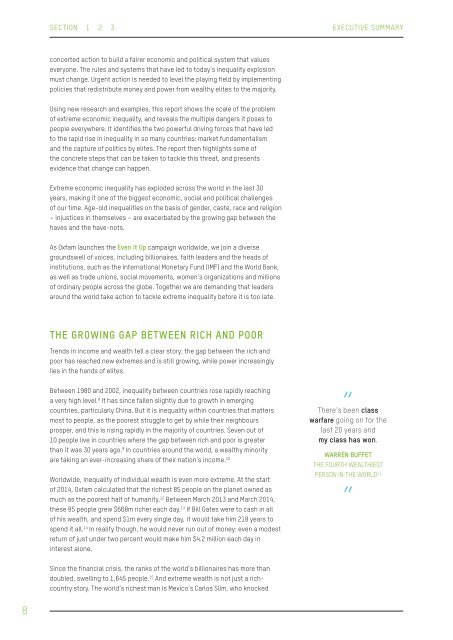1FW2e8F
1FW2e8F
1FW2e8F
Create successful ePaper yourself
Turn your PDF publications into a flip-book with our unique Google optimized e-Paper software.
SECTION 1 2 3 EXECUTIVE SUMMARY<br />
concerted action to build a fairer economic and political system that values<br />
everyone. The rules and systems that have led to today’s inequality explosion<br />
must change. Urgent action is needed to level the playing field by implementing<br />
policies that redistribute money and power from wealthy elites to the majority.<br />
Using new research and examples, this report shows the scale of the problem<br />
of extreme economic inequality, and reveals the multiple dangers it poses to<br />
people everywhere. It identifies the two powerful driving forces that have led<br />
to the rapid rise in inequality in so many countries: market fundamentalism<br />
and the capture of politics by elites. The report then highlights some of<br />
the concrete steps that can be taken to tackle this threat, and presents<br />
evidence that change can happen.<br />
Extreme economic inequality has exploded across the world in the last 30<br />
years, making it one of the biggest economic, social and political challenges<br />
of our time. Age-old inequalities on the basis of gender, caste, race and religion<br />
– injustices in themselves – are exacerbated by the growing gap between the<br />
haves and the have-nots.<br />
As Oxfam launches the Even It Up campaign worldwide, we join a diverse<br />
groundswell of voices, including billionaires, faith leaders and the heads of<br />
institutions, such as the International Monetary Fund (IMF) and the World Bank,<br />
as well as trade unions, social movements, women’s organizations and millions<br />
of ordinary people across the globe. Together we are demanding that leaders<br />
around the world take action to tackle extreme inequality before it is too late.<br />
THE GROWING GAP BETWEEN RICH AND POOR<br />
Trends in income and wealth tell a clear story: the gap between the rich and<br />
poor has reached new extremes and is still growing, while power increasingly<br />
lies in the hands of elites.<br />
Between 1980 and 2002, inequality between countries rose rapidly reaching<br />
a very high level. 8 It has since fallen slightly due to growth in emerging<br />
countries, particularly China. But it is inequality within countries that matters<br />
most to people, as the poorest struggle to get by while their neighbours<br />
prosper, and this is rising rapidly in the majority of countries. Seven out of<br />
10 people live in countries where the gap between rich and poor is greater<br />
than it was 30 years ago. 9 In countries around the world, a wealthy minority<br />
are taking an ever-increasing share of their nation’s income. 10<br />
Worldwide, inequality of individual wealth is even more extreme. At the start<br />
of 2014, Oxfam calculated that the richest 85 people on the planet owned as<br />
much as the poorest half of humanity. 12 Between March 2013 and March 2014,<br />
these 85 people grew $668m richer each day. 13 If Bill Gates were to cash in all<br />
of his wealth, and spend $1m every single day, it would take him 218 years to<br />
spend it all. 14 In reality though, he would never run out of money: even a modest<br />
return of just under two percent would make him $4.2 million each day in<br />
interest alone.<br />
“<br />
There’s been class<br />
warfare going on for the<br />
last 20 years and<br />
my class has won.<br />
WARREN BUFFET<br />
THE FOURTH WEALTHIEST<br />
PERSON IN THE WORLD 11<br />
”<br />
Since the financial crisis, the ranks of the world’s billionaires has more than<br />
doubled, swelling to 1,645 people. 15 And extreme wealth is not just a richcountry<br />
story. The world’s richest man is Mexico’s Carlos Slim, who knocked<br />
8


